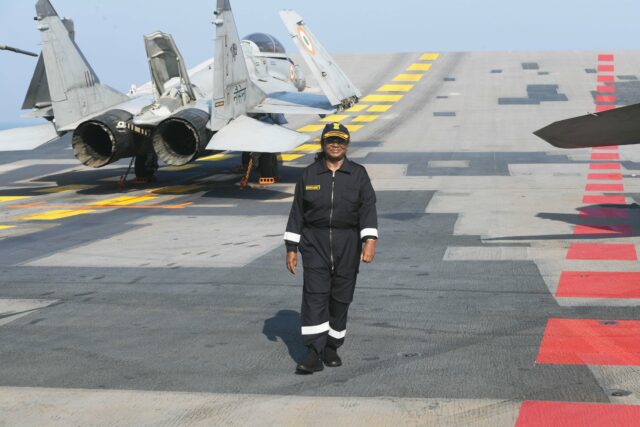
India begins a diplomatic outreach targeting southern Africa with the first ever back to back presidential visits to Angola and Botswana.
“Our engagement with Africa has grown across every pillar, political, economic, developmental, and people-to-people,” said Sudhakar Dalela, Secretary (Economic Relations) Ministry of External Affairs, while briefing the media. “The President’s visit comes at a time when both Angola and Botswana are key partners in our shared vision for sustainable growth and global South solidarity.”
The four-day visit to Angola on the Atlantic coast begins on Saturday. President Droupadi Murmu will hold talks with her counterpart João Lourenço and participate in the country’s 50th Independence Day celebrations. Lourenço was in India in May, marking the first visit by a head of state of that country in 38 years.
Angola is Africa’s second largest supplier of crude oil and liquefied natural gas, accounting for nearly 80% of bilateral trade worth $4.2 billion. With Angola’s exit from OPEC and efforts to expand production, Indian public and private firms are exploring equity stakes in offshore oil blocks and potential collaboration in refining and petrochemical projects.
“Energy and food security are critical dimensions of this partnership,” Dalela said in his response to StratNewsGlobal question. “Angola is rich in arable land, and they are keen to use Indian technology and expertise to enhance agricultural productivity.”
Angola also joined the International Solar Alliance earlier this year, becoming its 123rd member, and India is encouraging its participation in other global initiatives such as the Coalition for Disaster Resilient Infrastructure and the Global Biofuels Alliance.
Defence, Space Cooperation
Both leaders are expected to review the progress of the $200 million Line of Credit extended by India in May for the modernisation of Angola’s armed forces. It covers covers defence procurement, repair and overhaul of platforms, and training of personnel.
India also plans to offer expanded defence training slots under the Indian Technical and Economic Cooperation programme, which already trains officers from several African militaries.
Beyond defence, space collaboration is emerging as a new frontier. Angola is interested in leveraging India’s low-cost satellite and geospatial technologies for agriculture, disaster management, and communications. The two sides are expected to discuss cooperation through the Indian Space Research Organisation in building small satellites and capacity-building programmes.
Critical Minerals, Digital Infra
Angola has significant deposits of rare earths and critical minerals vital for India’s green transition, including cobalt, lithium, and nickel. As part of India’s National Critical Minerals Mission, New Delhi aims to explore joint ventures for exploration, processing, and value addition in Africa.
Luanda has shown strong interest in India’s Digital Public Infrastructure model, including platforms like Aadhaar, UPI, and DigiLocker. India is expected to offer technical cooperation to help these nations build transparent, inclusive, and interoperable digital ecosystems.
Botswana
From November 11–13, President Murmu will be in Botswana for talks President Duma Gideon Boko and address the National Assembly. The visit will coincide with preparations for the 60th anniversary of diplomatic relations between India and Botswana, to be celebrated next year.
Botswana’s Vision 2036 plan aims to diversify its economy and transition to a high-income society, an agenda that aligns with India’s development experience in agriculture, health, pharmaceuticals, and renewable energy.
Both nations are also cooperating on Project Cheetah, which involves the translocation of African cheetahs to India as part of a broader biodiversity conservation effort.
“With Botswana, our defence cooperation has a historic legacy,” Dalela noted. “Indian training teams were embedded with the Botswana Defence Forces for three decades, and we continue to train officers under the ITEC programme.”
Botswana has also shown interest in partnering with India in cybersecurity, railway connectivity, and space-based applications, building on its earlier collaboration in education and capacity-building.
The visits underscore India’s renewed diplomatic momentum across Africa. Over the past decade, New Delhi has opened 17 new embassies, extended over $12 billion in concessional credit, and offered $700 million in grant assistance to African partners. Trade between India and the continent has reached nearly $100 billion, supported by rising private-sector investments.




